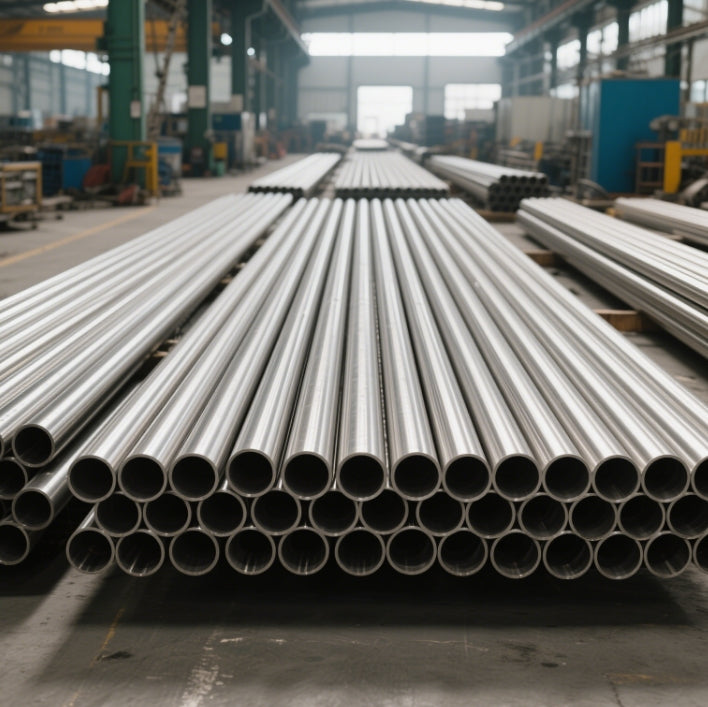StockSteel
Stainless Steel Pipes | AD 2000-Certified 304/316L Systems
Stainless Steel Pipes | AD 2000-Certified 304/316L Systems
Regular price
$1,200.00 SGD
Regular price
Sale price
$1,200.00 SGD
Taxes included.
Shipping calculated at checkout.
Quantity
Couldn't load pickup availability
Stainless Steel Pipes | AD 2000-Certified 304/316L Systems
Product Specifications
Engineered for extreme reliability, our stainless steel pipe systems meet AD 2000 standards for pressure equipment, ensuring compliance with global industrial safety regulations.
| Property | 304 | 316L | Reference Standards |
|---|---|---|---|
| Outer Diameter (mm) | 6–610 | 6–860 | ASTM A312, EN 10216-5 |
| Wall Thickness (mm) | 0.5–45 | 1–60 | ASME SA213, DIN 17456 |
| Hardness (HV) | 150–220 | 160–210 | ISO 6507, ASTM E384 |
| Tensile Strength (MPa) | 515–720 | 485–620 | AD 2000 W0/TRD 100 |
| Yield Strength (MPa) | 205–310 | 170–300 | PED 2014/68/EU |
| Elongation (%) | 35–45 | 40–50 | NACE MR0175 |
| Surface Finish | 2B, BA, Mirror Polished | Pickled, Bright Annealed | ASTM A480 |
| Certifications | ISO 9001, PED, TÜV | ISO 9001, PED, TÜV | ASME Section VIII |
Key Attributes
-
Material Composition
- 304 (UNS S30400): 18–20% Chromium, 8–10.5% Nickel, ≤0.08% Carbon.
- 316L (UNS S31603): 16–18% Chromium, 10–14% Nickel, 2–3% Molybdenum, ≤0.03% Carbon.
- Enhanced resistance to chloride-induced pitting and crevice corrosion in 316L due to molybdenum.
-
Applications
- stainless steel pipe fittings: Ideal for chemical processing, marine exhausts, and pharmaceutical pipelines.
- stainless steel pipe clamps: Used in HVAC, oil/gas pipelines, and structural supports for vibration resistance.
- Customizable diameters (6mm–2.5m) for boilers, heat exchangers, and potable water systems.
-
Manufacturing Process
- Seamless Pipes: Hot extrusion followed by cold drawing for precision tolerances (±0.1mm).
- Welded Pipes: High-frequency induction welding (HFIW) with argon shielding for oxide-free joints.
- Post-weld heat treatment (PWHT) at 1,040–1,120°C to eliminate sensitization risks.
Technical Performance
Tensile & Bend Strength
- 304: Tensile strength of 515–720 MPa ensures durability in food processing and architectural frameworks.
- 316L: Yield strength of 170 MPa and elongation up to 50% provide superior ductility for stainless steel pipe clamps in seismic zones.
Weight Calculation Formula
Calculate pipe weight (kg/m) using:
Example: A 100mm OD, 5mm WT 316L pipe weighs 11.9 kg/m.
Identification Marking
Pipes are laser-etched with:
- Grade (e.g., UNS S31603/S30400)
- Heat number and AD 2000 certification code.
Why Does Stainless Steel Rust?
Despite its corrosion resistance, stainless steel may rust under specific conditions:
- Chloride Exposure: Coastal environments or de-icing salts accelerate pitting in 304 grades.
- Galvanic Corrosion: Contact with carbon steel or copper alloys triggers electrochemical degradation.
- High-Temperature Oxidation: Prolonged exposure above 800°C degrades chromium oxide layers in 304.
- Welding Defects: Improper PWHT in 316L may cause chromium carbide precipitation.
Prevention Strategies:
- Use stainless steel pipe clamps with insulating sleeves to avoid galvanic contact.
- Select 316L for chloride-rich or acidic environments.
- Regular passivation with nitric acid to restore oxide layers.
Why Choose Our Stainless Steel Pipes?
- AD 2000 Compliance: Certified for pressure equipment in EU and ASME markets.
- Custom Solutions: Tailored stainless steel pipe fittings and clamps for complex installations.
- Global Logistics: Warehouses in Shanghai, Houston, and Rotterdam ensure 7–15-day delivery.
- Lifetime Warranty: 25-year guarantee against corrosion and material defects.

